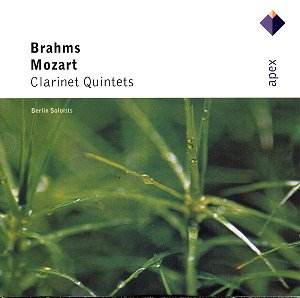The coupling of these two works, the greatest of their
kind, is an obvious one, though the catalogue is not exactly packed.
The finest currently available is probably David Shifrinís with the
Emerson Quartet on DG, though the direct competition for the current
issue is provided rather by Alessandro Carbonare and a talented young
string group on Harmonia Mundiís bargain label ĎLes nouveaux interprètesí.
However, the present disc is not to be dismissed lightly, for Leister
is an exceptional instrumentalist who has more recently recorded what
is probably the outstanding Brahms Quintet in the catalogue,
with the Leipzig Quartet on EMI. That, however, is coupled with the
composerís String Quartet no.2 in a minor, so this bargain Apex CD will
make a very attractive prospect for anyone wanting the two quintets
together.
Leister is a cool player, with a creamy, super-smooth
tone, who treats technical hazards with contemptuous ease. This means
that his interpretations have an almost detached quality about them,
without the emotional involvement or drama you would expect from a top
British player such as de Peyer or Janet Hilton. It does make a ravishing
experience in terms of the sheer sound produced. Taking but one example
what a stunningly beautiful outpouring is the slow movement of the Brahms.
On the other hand, I could definitely do with more sensitivity to the
ebb and flow of the music in the powerful first movement. The finale,
too, suffers from a lack of real tonal variety, for which the very close-up
recording may be partially to blame. The calmly relaxed third movement
is given an ideal performance, with a touch of gentle humour where necessary.
The Mozart fares better on the whole, though Gellermanís
violin playing is a little heavy-handed here and there (e.g. his rather
lumpy phrasing of the minuetís first trio, track 3, 1:24). The variations
that constitute the finale, are well contrasted, though, and the piece
as a whole succeeds well.
Despite my slight reservations, this is a very worthwhile
issue, coupling two major masterpieces of the chamber music repertoire
in intelligent and immaculately prepared readings.
Gwyn Parry-Jones


